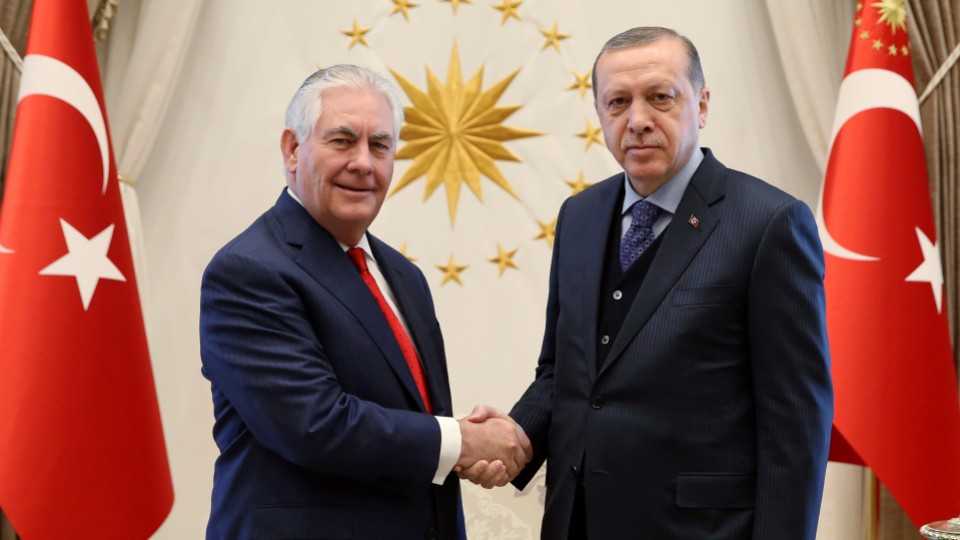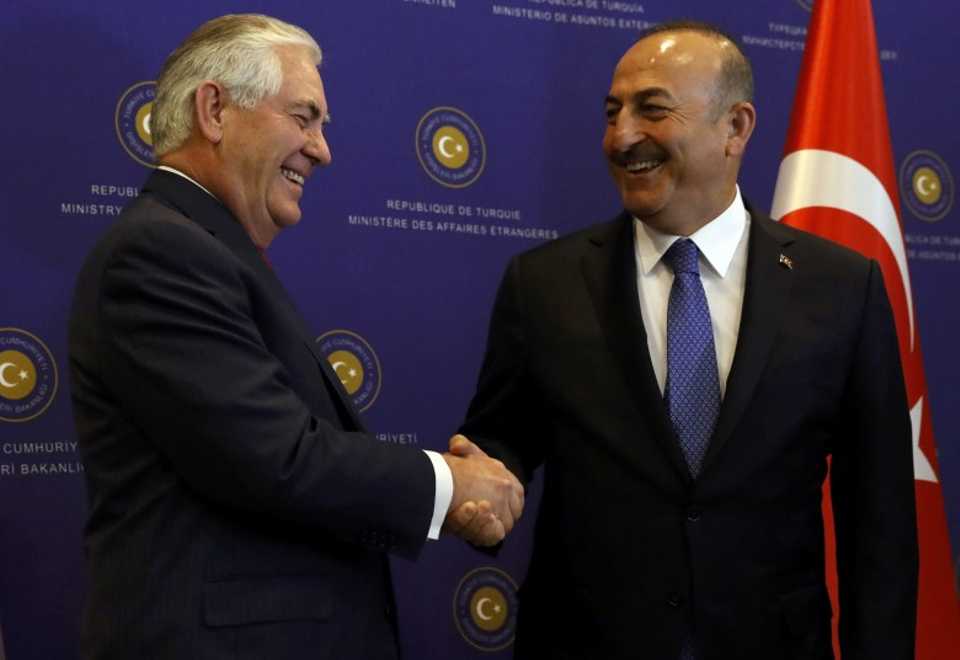
Turkey’s President Recep Tayyip Erdogan on Thursday called for supporting “right and legitimate” actors in the fight against Daesh, during a meeting with US Secretary of State Rex Tillerson.
Turkey has been incensed by US support for the YPG, which Ankara sees as a hostile force, in the fight against Daesh in northern Syria.
The YPG is the armed wing of the PYD, which is a Syrian affiliate of the PKK. The PKK is designated by Turkey, the EU and US as a terrorist organisation. But Washington regards them as a key force in the fight against Daesh.
Tillerson was in Ankara for discussion with the Turkish president and other senior Turkish leaders for talks on a range of issues that included the regional struggle against terror, Turkey-US relations and Ankara’s request for the extradition of Fethullah Gulen, whom Turkey accuses of masterminding last year’s failed coup.
TRT World’s political correspondent Hasan Abdullah has more.
Operation Raqqa minus YPG
Erdogan told Tillerson that Turkey is willing to cooperate in the operation to liberate Raqqa provided the YPG is not involved.
Raqqa is the defacto capital of Daesh in Syria and is seen as the terror group’s stronghold in the country.
The US secretary of state arrived in Ankara on Thursday, where he also met Turkey’s Prime Minister Binali Yildirim and Foreign Minister Mevlut Cavusoglu.
He is the most senior American official to visit Turkey since the inauguration of President Donald Trump in January.
Yildirim and Tillerson spoke about ongoing efforts to clear Daesh from Syria and Iraq during their meeting.
Prime Minister Yldrm received Secretary of State Tillerson paying his first visit to Ankara. pic.twitter.com/f02KY90EV0
— Mevlt avuolu (@MevlutCavusoglu) March 30, 2017
Yildirim said that the US had not yet informed Turkey of its decision on the Raqqa campaign.
"The developments give an impression that the Trump administration is following the path of the past administration," he said, referring to the same tensions of the Barack Obama years over the YPG militia's role.
Speaking during a joint press conference on Thursday afternoon, Cavusoglu said that Turkey-US relations suffered under the previous US administration and that the "US support for YPG is a significant risk."
"It's not appropriate to cooperate with a terror organisation. Now we are expecting better cooperation from the US."
Cavusoglu said that the other "dubious policy" followed by the previous US administration was blocking the extradition of Gulen.
Ties between Ankara and Washington were strained under the Obama administration over US cooperation with YPG in the fight against Daesh and also its reluctance in extraditing Gulen.
Turkish officials hope relations will improve under Trump's administration and that Washington will take the Gulen issue "more seriously."
Ankara blames Gulen for orchestrating a failed coup last July and wants US authorities to curtail the activities of Gulen's network in the US.
In his address, Tillerson said that his talks with Turkish officials focused on the creation of stabilisation zones in Syria, and that a number of options on how to secure such areas were being explored.
He said that Turkey was a key partner in the fight against Daesh, and the two nations shared a goal of reducing Iran's potential to disrupt the region.
"Turkey has shown leadership in handling the refugee crisis from Syria, Afghanistan and Pakistan."

Tensions over banker's detention
Tillerson's visit also touched on the US detention of a senior Turkish state bank executive on Wednesday.
Halkbank's Mehmet Hakan Atilla is accused of helping to process millions of dollars of illegal transactions through US banks for Iran's government and other Iranian institutions.
The Turkish prime minister said that Ankara brought the issue up with Tillerson and would closely monitor the legal process.
Earlier on Thursday, Turkey's Justice Minister Bekir Bozdag said Atilla's arrest in the US was "completely a political operation."
Turkey also voiced anger on Thursday after it emerged that the US consulate in Istanbul had contacted a chief suspect accused of plotting the attempted putsch, who is currently on the run.
The US embassy in Turkey said that its Istanbul consulate contacted theology lecturer Adil Oksuz only to inform him that his American visa had been revoked.
Yildirim said the embassy statement was not enough.
Oksuz was detained in the aftermath of the putsch, but then released.
He has since been on the run.










Discussion about this post